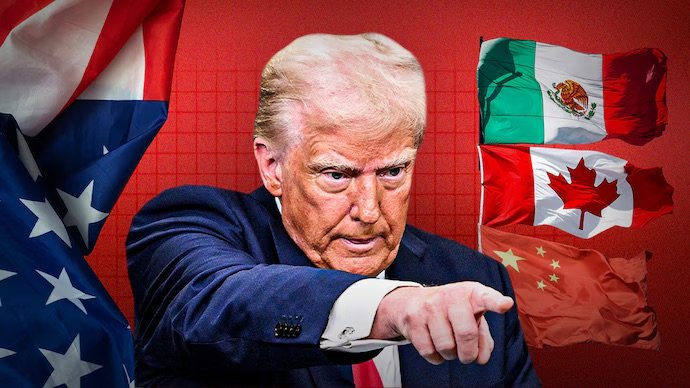WASHINGTON — As economic uncertainty grips Washington, President Donald Trump’s administration is justifying sweeping new tariffs on Canada and Mexico by linking them to fentanyl trafficking.
Commerce Secretary Howard Lutnick defended the move in a CNBC interview Tuesday, insisting, “This isn’t a trade war—it’s a drug war.”
Trump’s executive order, which took effect the same day, imposes 25% tariffs on all Canadian and Mexican goods and an additional 10% duty on Canadian energy exports. He invoked the International Economic Emergency Powers Act (IEEPA), citing national security concerns due to fentanyl smuggling at the northern border.
Questionable Justification?
Despite the administration’s strong rhetoric, U.S. Customs and Border Protection (CBP) data contradicts the fentanyl narrative, showing only 13.6 grams of the drug seized by northern border agents in January—an insignificant amount compared to what enters through Mexico.
When pressed on whether fentanyl was merely a pretext for trade restrictions, Lutnick sidestepped the question, instead emphasizing an ongoing tariff review set to conclude on April 2. He also claimed that Canada’s general sales tax functions as a tariff, a statement widely disputed by trade experts.
Meanwhile, Trump took to social media, arguing that U.S. companies relocating operations back home would be exempt from the new tariffs. He also repeated the false claim that American banks are barred from operating in Canada.
Canada Responds with Retaliation
Prime Minister Justin Trudeau condemned the tariffs as “reckless” and a “continental trade war,” announcing that Canada will immediately impose 25% retaliatory tariffs on $30 billion worth of U.S. goods. He warned that an additional $125 billion in tariffs could follow within three weeks.
Trump quickly fired back online, demanding that Trudeau “explain” that any Canadian countermeasures will result in even higher U.S. tariffs.
While Trump himself has largely avoided discussing fentanyl in his public statements, his administration remains committed to using the crisis as justification. Vice President JD Vance accused Canada of failing to curb drug trafficking, stating, “Canadians haven’t taken the fentanyl problem seriously enough.”
U.S. Lawmakers Voice Concerns
Even within Trump’s own party, concerns over the tariffs are growing.
- Senate Majority Leader John Thune (R-SD) expressed reservations, telling Fox News he views tariffs as a “temporary tool, not a long-term solution.”
- Senator Susan Collins (R-ME) criticized the policy, emphasizing that Maine’s economy is closely tied to Canada, particularly in seafood and agriculture.
- Democratic Senate Minority Leader Chuck Schumer blasted the tariffs, warning that American consumers will bear the cost.
Canada Ramps Up Border Efforts
Since Trump’s initial tariff threat, Canada has taken significant steps to strengthen border security, including:
✅ Appointing a “fentanyl czar”
✅ Labeling Mexican drug cartels as terrorist organizations
✅ Increasing joint enforcement operations with U.S. agencies
✅ Deploying more helicopters, drones, and border officers
Despite these efforts, the tariffs remain in place, fueling economic uncertainty and diplomatic tensions. Whether the administration’s fentanyl justification will hold up under scrutiny remains an open question.

 English
English



























































